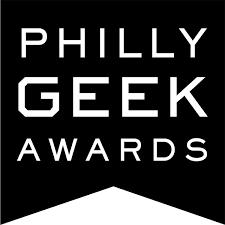 So stoked to present the Scientist of the Year award tonight at the Philly Geek Awards!! Here are the nominees in the Scientist of the Year category. Other categories include Geek of the Year, Start Up of the Year, Maker of the Year and more. I’ll post information on the winner once that’s revealed, tonight!!
So stoked to present the Scientist of the Year award tonight at the Philly Geek Awards!! Here are the nominees in the Scientist of the Year category. Other categories include Geek of the Year, Start Up of the Year, Maker of the Year and more. I’ll post information on the winner once that’s revealed, tonight!!

Dr. Danielle Bassett applies graph theoretical work in math and physics to the study of real-world networks, most notably the human brain. She publishes in the fields of applied math, engineering, psychology, psychiatry, and neuroscience. In 2006 she wrote (with Ed Bullmore) the seminal work on “small-world” structure in the human brain, now with over 1,100 citations, illuminating how the brain balances tight, nearby functional “communities” with long-range cross-brain communications. She was a 2014 MacArthur Fellow (the “Genius” grant), and in Spring 2016 was awarded tenure in the Bioengineering Department at Penn after only 2.5 years.

Stephan Grupp treated Emily Whitehead, for whom the Emily Whitehead Foundation is named. Enrolled in an experimental T-Cell Therapy clinical trial at Children’s Hospital of Philadelphia (CHOP), she became the first child in the world to have her immune system trained to fight cancer. With the help of Grupp and others, not only did Emily survive, in just a few weeks she was declared cancer free — she’s now 11 and healthy.

Dr. Himmelstein is a leader in the areas of open data licensing and open science. Using open resources, he carried out a research project that aims to find new uses for existing drugs entirely in the open (https://thinklab.com/p/rephetio), and his predictions are freely available to the scientific community at http://het.io/repurpose/. A recent article in Nature highlighted his struggles with data licensing during this project (https://doi.org/bndt). Not content with simply performing open science in an ivory tower, Dr. Himmelstein has engaged with the Philadelphia tech community. Since arriving he has launched Project Cognoma, a citizen-science project to enable every cancer biologist to apply sophisticated machine learning algorithms to large public cancer genomics datasets. This project has been run in collaboration with Code for Philly and DataPhilly, and Daniel has spearheaded the operation.

